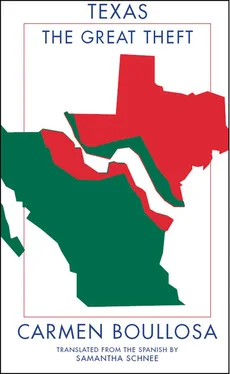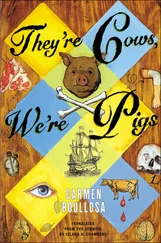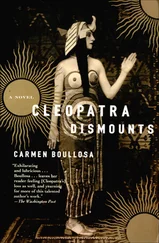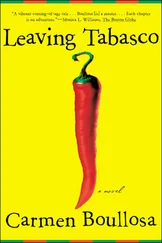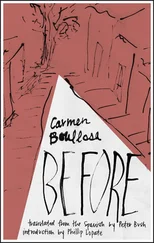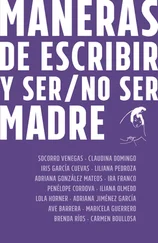The real philosopher is Nepomuceno’s wife. She’s never seen with him. They have a daughter who’s nearly twenty. Nepomuceno had barely started shaving when the widow Isa began chasing him, though there are some folks who disagree, claiming that the life he led out on the plains, among horses and vaqueros , awakened his interest in women and taught him about the birds and the bees long before he met the widow Isa, and that she, on the contrary, was quite demure! To this day Doña Estefanía can’t stand the sight of her. But from the moment he shot Shears, he hasn’t given one thought to his mother or his wife or his daughter. Nepomuceno’s eyes wander from one woman to another, recently he only has eyes for La Desconocida, but he doesn’t let on.
Dan Print does let on that he likes her, a lot. He’s fallen in love with her. He knows Nepomuceno’s also interested — male intuition — so he keeps it to himself and acts friendly.
He asks her what her name is. “I’m Magdalena Gutierrez, at your service.” Where was she born, who were her parents, what’s her story? “You married?” He hadn’t heard the gossip about her husband beating her, as she told Nepomuceno. “Married, but I would never go back to that wretch, even if they tied me up.”
Married? he thought. She might as well be divorced already, what does it matter to me?
Mr. Blast, the freebooter, can’t get Nepomuceno to agree to anything. Nepomuceno, on the other hand, gets all kinds of information out of him about the U.S. troops: where specific regiments are stationed; the central government’s intentions; and its positions regarding the border.
Dan Print sticks around after Blast leaves — but not to have long conversations with La Desconocida; instead of returning to New York he shuts himself in the Ángeles del Río Bravo in Matasánchez (in Room 221, it’s his base), planning to write his article on Nepomuceno. First he makes a trip to Doña Estefanía’s ranch — she won’t meet him, she’s too upset about her son, but he speaks with both half-brothers — then he goes to another ranch to see Nepomuceno’s wife and daughter, where he speaks with them both (it was a poor suggestion by his editor, Nepomuceno has no bigger fans than these two women), and he also asks around in Bruneville. The other two brothers, the ones who are his enemies and rivals, refuse to speak to him. La Plange shows him photos of Nepomuceno from back when he was a great vaquero and rich landowner, before he became what he is now, the leader and hero of “La Raza.” There are photos of Nepomuceno twirling his lasso in elegant circles, mounting a horse, leaving Mass (dressed all fancy), and some taken in La Plange’s studio.
Later, Dan Print returns to the Ángeles del Río Bravo, finally (he thinks) ready to write his piece on Nepomuceno. Now he’s thinking it will be a book. But he’s distracted, coming and going between Laguna del Diablo and Matasánchez. He makes these trips just to see La Desconocida. Then he shuts himself in his room to write, but he spends the time yearning for her.
One night he can’t sleep for worrying: what will his mother think of this woman, a Mexican divorcée with no money (by the time he introduces her she’ll be divorced)? “She has to speak English, at least,” he says to himself, and on his next visit to Laguna del Diablo he begins teaching her the language.
Nicolaso’s dovecote is empty, his heart restless. He’s tormented by the sensation that he’s imprisoned. The pigeons are his windows, his doors, his bridges, his air, his freedom. It’s not just any old day: when Nicolaso hears the bell of the dovecote ring, signaling the arrival of a pigeon, he runs to see what the message is. The message puts him to rights.
He goes out, walking the few steps to the Café Ronsard. No one’s there yet. He orders a coffee. Teresa comes down from upstairs, beautiful as ever. She’s sad.
“Well, what’s wrong with you?”
The beauty smiles and begins to talk, but Carlos enters the café and duty calls. Nicolaso can’t wait, he excuses himself and goes over to Carlos to give him the message: We’ll enter in two days.
Carlos doesn’t say a word. He acts like he hasn’t even heard Nicolaso. Nicolaso goes back to Teresa. She’s smiling now, and can’t even remember why she was sad when she came down — seeing her friends cheers her up.
Carlos takes the drink the barkeep has made him and sits down at a table. He waits for the five Eagles to arrive and gather round, spitting.
“On the full moon,” says Carlos.
“We put the plan into action.”
“And follow it to a ‘T’.”
At dusk, they take advantage of the tide to cross the river, not from the Bruneville dock but further upriver, at a makeshift dock hidden among the reeds, the one Úrsulo has used for a long time now.
Although Doña Estefanía can’t stand the “widow” Isa, Nepomuceno’s wife, and avoids her at all costs, she sends her a letter asking her to speak with “my son,” to talk some sense into him and get him to give up his plans. She explains that it’s not worth it to her to risk her son’s life just to recover the land “where the gringos built Bruneville;” it would all be meaningless if she lost Nepomuceno, she must make him understand that you can’t take on Samson without a barber. She must find him and convince him of this.
The letter comes as a blow to Isa — the feeling is mutual, she despises her mother in law — but it gets her thinking.
“Something must be done,” she reflects.
She knows him well, she thinks. If she visits him at his camp, he’ll be irritated and disgusted with her.
She must find a way to make it seem like she’s encountered him by chance.
“The time will come,” she thinks.
Magdalena, whom Nepomuceno’s men call La Desconocida, is practically a stranger to herself. Without her room — which was kept in strict order by her maids ever since she was married — and without the threat of Gutierrez, she is caught up in the collective fervor of the Nepomucenistas. She learns the meaning of the looks she has been catching handsome Nepomuceno giving her when she receives them from Dan Print and compares the two. Dan Print has his charms, despite the fact he doesn’t know how to ride or give orders. But Nepomuceno has won her. She’s devoted to him. Still, there’s an abyss between her devotion and her actually initiating something with him. He’s a married man, and though he rules Magdalena’s heart, for the time being she is content to serve his cause.
Her hair’s her biggest problem. How to keep it from looking messy. But she’s figuring it out. Everyone can see she’s glowing, growing more beautiful by the day. Nepomuceno has bought her riding boots, but she won’t wear pants like the Negress Pepementia and other women in the camp.
Fragrance, General Cumin’s scout, requests permission to depart.
“Since when do you need my permission, Fragrance, to leave my presence?”
“No, my General, I mean I’m leaving camp.”
“Where are you going?”
“To end my stay in this place, I don’t like it one bit. I have nothing to do here. Bruneville is a city (an ugly one), not the prairie, there’s no air, it’s like being locked up. My General, I just need to get some fresh air and then I’ll be back.”
“Get some air?”
“But if you’re staying here I won’t return.”
Dimitri, the Russian, is also leaving because he’s had enough. The Americans ignore the reports he makes at the fort to the military authorities, three different ones with details about the Eagles’ activities in Bruneville. They filed them away without even reading them, and they still haven’t paid him either, despite their agreement. General Cumin doesn’t trust him because he’s a foreigner; and because of the General’s prejudice against him the rest of the gringos don’t trust him either, they suspect he’s one of Nepomuceno’s men, despite the fact it couldn’t be further from the truth.
Читать дальше
